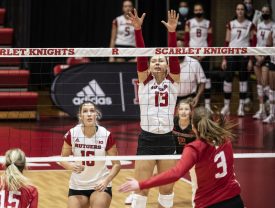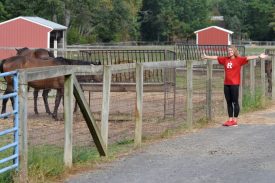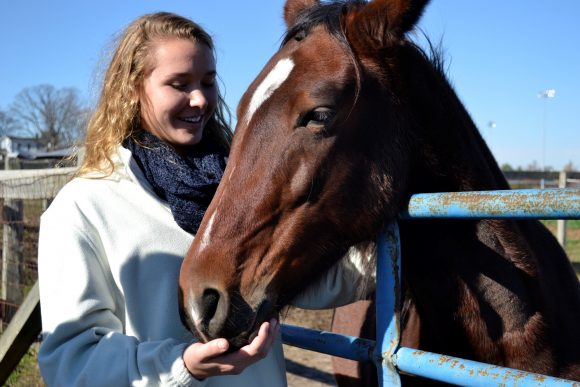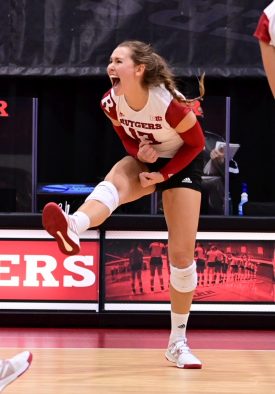When Kamila Cieslik (SEBS’22) entered her senior year in September 2020, the world was in the middle of a pandemic. Navigating this world meant lots of screen time (which started after spring break the previous semester.) For athletes like Kamila—a member of the Rutgers women’s volleyball team—it also meant putting off the season until the spring and then finding a way to participate safely.
The Newsroom caught up with the George H. Cook Scholar, majoring in Animal Science, shortly after she scored a career high goal this past spring, to ask her about her SEBS experience on and off the court.
Newsroom: Tell us what it was like when campus shut down.

The Rutgers Scarlet Knights women’s volleyball team take on the Indiana Hoosiers on 1/29/21 in Piscataway. Photo: Ben Solomon, Rutgers Athletics.
Cieslik: I was originally scheduled to graduate in the spring of 2021, but when COVID hit, our fall volleyball season was postponed to the spring after a few months of uncertainty. It was kind of like an extra season, because normally we play in the fall. After all that waiting, it was a very successful season for us. We made some good strides. We’ll start pre-season training in the summer. Then I’ll have my final season in the fall (which is bittersweet). And I am excited for the regular fall season.
I might be luckier than some students in terms of being involved in a sport. We were all doing classes virtually, and the team was in its own bubble. So when we started to travel during the season—of course we wore our masks and tested every day—but being in our own cohort allowed us a little bit of freedom among all this craziness. We didn’t have to worry so much about COVID when we were around each other and were able to focus on training. We were also lucky enough to not have to wear masks when we played since we kept testing negative.
Newsroom: Tell us about that career-high goal.
Cieslik: It was 12 kills for a match which was a high score for me. And that was at our first game vs. Michigan State. A kill is a third touch. First touch is a pass and the second touch is called a set. The setter will set the ball up and that’s when I overhand hit it and it either goes straight to the ground for a point or off of someone for a point. Pass, set, kill!
It was a very emotional, but fun, last two games. We were fighting hard. It was good volleyball and really fun and great to end on those two wins. We were really proud; it was such a team effort!
Our coach was also very proud of us. Caitlin Schweihofer is our coach. It’s her first year here. She came last spring, actually, and she’s made a lot of changes in one year and we’re super excited to have a whole new staff. We’re really gelling, working really well, so it’s looking very positive for the program.
Newsroom: What was it like balancing volleyball with academics?
Cieslik: I’ve actually met all of my requirements, except for one class which I purposely left for this coming semester so I would have a reason to stay and play that ‘fifth year.’ Since COVID messed up everyone’s schedules, the NCAA granted every athlete another year of eligibility, giving me a chance to finish out my college volleyball career. It means a lot to me to be able to stick around for one more season.
Newsroom: You’ve done very well academically, will graduate with a degree in Animal Science-Equine Concentration, and have been part of the George H. Cook Honors Program. Tell us more about that.
Cieslik: My George H. Cook Honors Scholar Thesis was Combining Quantitative and Qualitative Behavior Assessments to Measure Equine Stress; it’s somewhat related to my future ambition.
It’s part of a bigger project run by PhD candidate Ellen Rankins. She is combining that aspect of stress and coordination between the animal and the human. She’s working with veterans with PTSD and monitoring some other stress levels and interactions between humans and the horse with regards to equine assisted therapy.
Ellen works at Special Strides Equine therapy center and I have volunteered there as well. I’ve done volunteering of that sort throughout my whole life actually. That is what is leading me towards occupational therapy as a career. Ellen’s project is really diving into that; it’s very exciting.
Newsroom: Have you always been involved with horses?
Cieslik: Yes, I grew up riding horses. For my eighth or ninth birthday, my parents took me to a barn for a lesson and ever since then I’ve been involved. I’ve always loved horses and wanted to work with them, be around them. That’s a big reason why I came to Rutgers. On my unofficial visit for volleyball—they were recruiting me—they said ‘hey we have a great Equine Science Center (ESC).’ Karyn Malinowski is really one of the main reasons I came to Rutgers…meeting her, seeing what they do here at the ESC. I just fell in love…combining the academics and volleyball with Equine Science.
Newsroom: They recruited you for volleyball and was this the cherry on the cake?
Cieslik: It was the main course for me! All of it together was great.
Newsroom: You thankfully spent the majority of your undergraduate career in person. How has it been doing online classes?
Cieslik: There’s definitely something great about being in person, being able to learn from a professor during a lecture. Luckily I’ve been taking one online class almost every semester since I got here. Being on the volleyball team and traveling, they recommend you take online courses so you don’t fall behind in credits. You can take one or two online classes to keep up, so I’ve had that base experience of knowing how to handle online and in-person classes.
And having that tough schedule makes you prioritize time management—being focused, getting things done—that’s helped me.
I think it also depends very much on the class and the professor, if they’re able to make the online course engaging. For example, last semester I had a lot of synchronous courses; you have to log in and have a live zoom with the professor and your classmates. I really enjoyed that because you were still able to interact with the professor and classmates and have discussions. During this past spring semester, my classes were asynchronous so sometimes I felt like I was almost teaching myself!
Newsroom: As far as your career goes, is there something that stands out for you as being particularly inspiring—a teacher or a moment, something that really changed your life?
 Cieslik: I would say meeting with Dr. Malinowski and having her full heartedly wrap up anyone who is willing and eager and take them on this ride of equine science and share her passion. She gives us the freedom & courage to explore and is a joy to learn from her. That’s what really got me here was seeing her passion and how easily she shares that with others. That and our new coaching staff this past year; it has really turned volleyball around for me. Those two things are really stand out moments for me in my career. The people you meet along the way that have little impacts on you—teammates and classmates and adults—are also enormously important.
Cieslik: I would say meeting with Dr. Malinowski and having her full heartedly wrap up anyone who is willing and eager and take them on this ride of equine science and share her passion. She gives us the freedom & courage to explore and is a joy to learn from her. That’s what really got me here was seeing her passion and how easily she shares that with others. That and our new coaching staff this past year; it has really turned volleyball around for me. Those two things are really stand out moments for me in my career. The people you meet along the way that have little impacts on you—teammates and classmates and adults—are also enormously important.
Newsroom: What are you going to miss the most when you graduate in the fall?
Cieslik: That’s a hard one. I would miss the team obviously and the coaches and the great thing that we’re building here. But I know they will continue that on their own. But also I will miss—as weird as this sounds—I’ll miss going to lectures and seeing people in person because I really miss that. I’m sure I’ll stay in touch with Dr. Malinowski and Ellen Rankins. I will miss them as well.
Newsroom: What are your plans for the future and will it include volley ball?
Cieslik: Not professionally. I have enjoyed it very much and am grateful for the opportunity to play here but I am excited and ready to get into the workforce and see what I can do without volleyball in my life. I’m thinking about getting into occupational therapy so I’d like to do some internships in the fall and even after graduation. So I get more of a feel for that, then potentially I get a job and go into graduate school.
I am so grateful for everything that’s happened along the way: the opportunities that have been presented to me, and the people I’ve met along the way.



